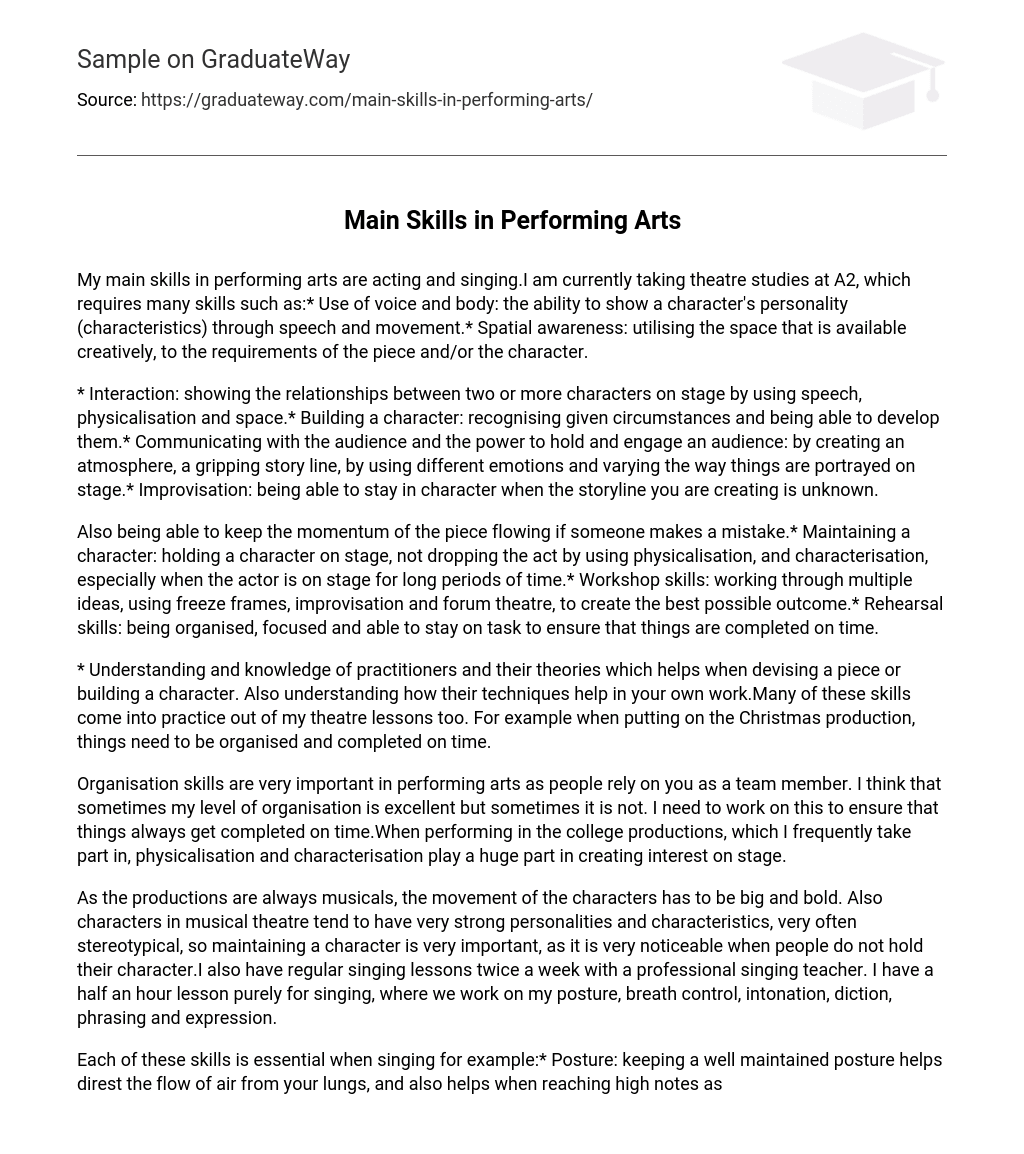My main skills in performing arts are acting and singing.I am currently taking theatre studies at A2, which requires many skills such as:* Use of voice and body: the ability to show a character’s personality (characteristics) through speech and movement.* Spatial awareness: utilising the space that is available creatively, to the requirements of the piece and/or the character.
* Interaction: showing the relationships between two or more characters on stage by using speech, physicalisation and space.* Building a character: recognising given circumstances and being able to develop them.* Communicating with the audience and the power to hold and engage an audience: by creating an atmosphere, a gripping story line, by using different emotions and varying the way things are portrayed on stage.* Improvisation: being able to stay in character when the storyline you are creating is unknown.
Also being able to keep the momentum of the piece flowing if someone makes a mistake.* Maintaining a character: holding a character on stage, not dropping the act by using physicalisation, and characterisation, especially when the actor is on stage for long periods of time.* Workshop skills: working through multiple ideas, using freeze frames, improvisation and forum theatre, to create the best possible outcome.* Rehearsal skills: being organised, focused and able to stay on task to ensure that things are completed on time.
* Understanding and knowledge of practitioners and their theories which helps when devising a piece or building a character. Also understanding how their techniques help in your own work.Many of these skills come into practice out of my theatre lessons too. For example when putting on the Christmas production, things need to be organised and completed on time.
Organisation skills are very important in performing arts as people rely on you as a team member. I think that sometimes my level of organisation is excellent but sometimes it is not. I need to work on this to ensure that things always get completed on time.When performing in the college productions, which I frequently take part in, physicalisation and characterisation play a huge part in creating interest on stage.
As the productions are always musicals, the movement of the characters has to be big and bold. Also characters in musical theatre tend to have very strong personalities and characteristics, very often stereotypical, so maintaining a character is very important, as it is very noticeable when people do not hold their character.I also have regular singing lessons twice a week with a professional singing teacher. I have a half an hour lesson purely for singing, where we work on my posture, breath control, intonation, diction, phrasing and expression.
Each of these skills is essential when singing for example:* Posture: keeping a well maintained posture helps direst the flow of air from your lungs, and also helps when reaching high notes as the stomach muscles are used frequently. Also posture makes you look like a singer rather than some who is singing because they have to.* Breath control: using your diaphragm instead of lifting your shoulders enables you to hold a lot more air and it is easier to maintain a note. The more someone works on their breath control the better it gets, by not having to take a breath during phrases it makes the piece you are singing sound a lot more complete.
* Intonation: the ability to pitch a note correctly, it sounds obvious but when the accompaniment is playing something which is off putting, dischords for example, it is important that the singer is able to pitch the right note despite what the piano is playing.* Diction: the pronunciation of the lyrics you are singing. Pronouncing vowels is important too.* Phrasing: the manner in which a phrase is rendered or interpreted* Expression: how the song is sung, adding emotion to the lyrics and dynamics to different parts of the song, also facial expressions help to draw in and hold the audience, to sing the words as if you really mean them, even though you may not have wrote the song.
I love to sing and I think it’s what makes me want to improve all the time. Although, there are some things I need to work on including diction: I need to think about how to pronounce the words right at the beginning when I first start to learn a song as I tend to develop habits which I find difficult to break.My second lesson is for twenty minutes and this lesson is based on aural practice. The reason I have this lesson is because I find it particularly difficult to achieve the required ability for some of the exercises put to me in exams.
I mainly work on singing back a melody, which requires me to listen to and then repeat a melody correctly. I find this particularly difficult because I find it hard to remember the notes as well as the rhythm. One of the only ways to overcome this is repetition, so my short aural lessons are gradually helping me.Also I find sight singing difficult, I need to learn to look at the piano part as well as the melody that I am expected to sing as there are normally a lot of similarities between them.
I also need to remember to count, this is one of my big downfalls in music, right from a young age I have never counted and always played or sung what is in front of me, but now as the pieces that I tackle are gradually getting a lot harder and more technical I am finding it difficult to keep in time. This can be overcome quite easily by tapping my foot but I very often forget. This is one of the main things that I want to improve over this year, my ability to count and also remembering to scan the piano part before hand.





